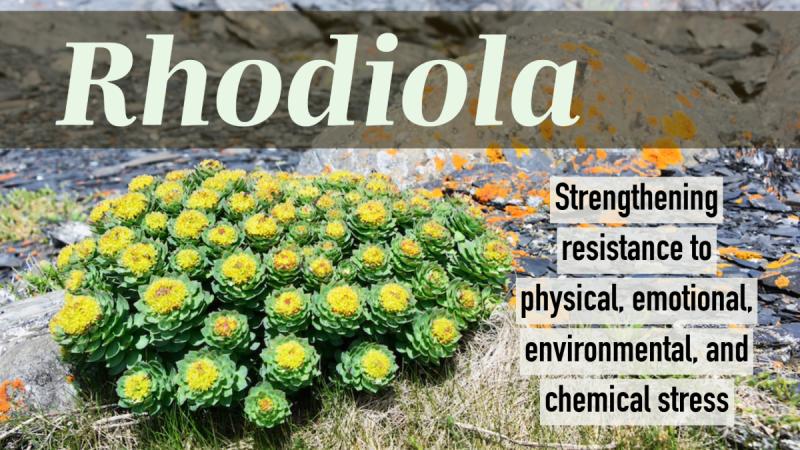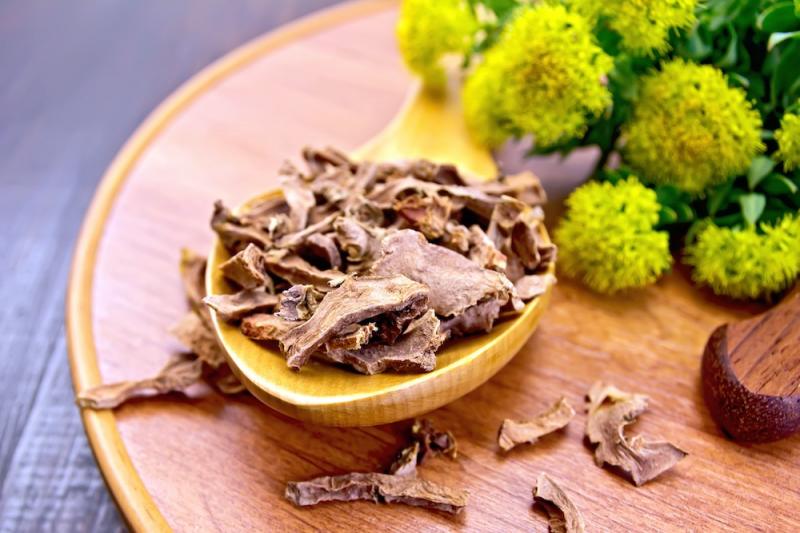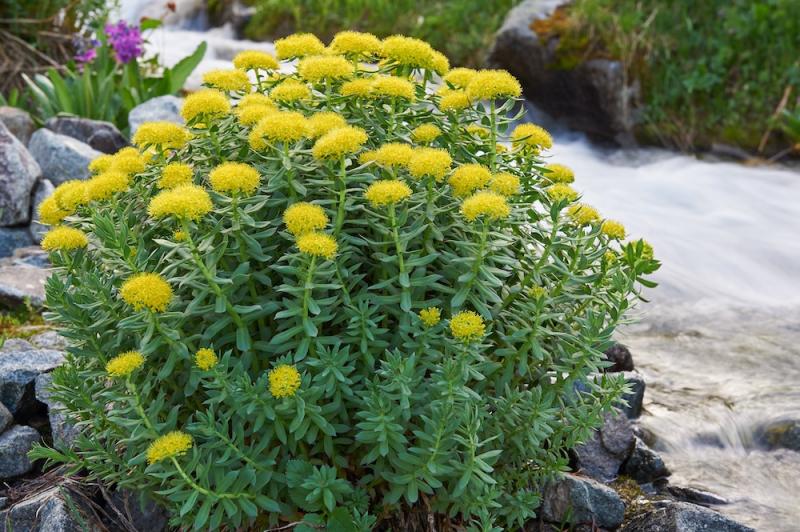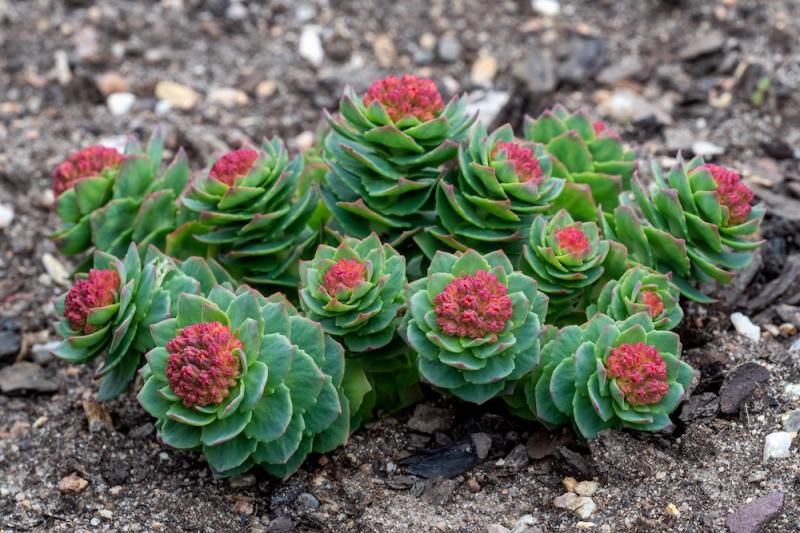
Continuing this month’s theme of stress management, here’s another major adaptogen that can be useful in dealing with stress. It’s Rhodiola rosea, and like eleuthero, the research on this adaptogen came primarily from Russia.
I have less direct experience with rhodiola than I have with the other adaptogens because it is quite astringent and therefore drying. And because I was living in a hot, desert climate I already tended to suffer from dryness so I didn’t find rhodiola very helpful because it compounded on that dry condition. In contrast, the sour or cooling nature of schisandra and bitter-sweet and tonic effects of eleuthero are better suited to dry conditions.
Rhodiola is a good example a nourishing adaptogen. Thomas Easley, co-author of our book Modern Herbal Dispensatory, introduced me to this category of herbs. Nourishing adaptogens have a more relaxing effect that is helpful when the body is depleted.
On the other hand, schisandra and eleuthero are both stimulating adaptogens, which means that taken in higher doses or over longer periods they can have an effect similar to caffeine and can stress the body when energy is already low.
Properties of Rhodiola
 Rhodiola is native to cold regions of the world including the mountains of central Asia and Europe, and the Siberian area of Russia. It’s known to help with altitude sickness, and it is also reported to increase tolerance to cold weather. It has been taken regularly by people in Siberia to help prevent wintertime illness.
Rhodiola is native to cold regions of the world including the mountains of central Asia and Europe, and the Siberian area of Russia. It’s known to help with altitude sickness, and it is also reported to increase tolerance to cold weather. It has been taken regularly by people in Siberia to help prevent wintertime illness.
It is a broad-acting remedy that seems to help build up and balance the body. For example, it helps increase stamina and endurance during exercise, a property it shares with corydalis and eleuthero. It also aids recovery after exercise. It helps the cardiovascular system, protecting it from stress and may help relieve stress-related heart problems like irregular heartbeat.
Rhodiola and Stress
 Like eleuthero, rhodiola appears to help balance the HPA axis, which helps to reduce feelings of stress and anxiety. It’s also helpful when someone is suffering from burnout. This is when a person becomes depleted due to chronic stress, leaving them feeling tired, weak, and irritable. When you’re burned out you also have difficulty sleeping, difficulty concentrating, and feel like you just “can’t take it anymore.”
Like eleuthero, rhodiola appears to help balance the HPA axis, which helps to reduce feelings of stress and anxiety. It’s also helpful when someone is suffering from burnout. This is when a person becomes depleted due to chronic stress, leaving them feeling tired, weak, and irritable. When you’re burned out you also have difficulty sleeping, difficulty concentrating, and feel like you just “can’t take it anymore.”
Rhodiola also appears to enhance immune function through its ability to modulate the stress response. The stress response suppresses immune activity. It also helps boost the immune system when it has been depleted by chemotherapy and radiation and may have some anticancer effects of its own. This makes it a potentially useful herb for someone undergoing traditional cancer treatments.
Other Uses for Rhodiola
 Rhodiola also appears helpful for depression brought on by stress. Research suggests that extracts of rhodiola can increase neurotransmitter levels in the brain. Rats given a water extract of rhodiola had increased levels of dopamine, norepinephrine, and serotonin, neurotransmitters that elevate energy and mood.
Rhodiola also appears helpful for depression brought on by stress. Research suggests that extracts of rhodiola can increase neurotransmitter levels in the brain. Rats given a water extract of rhodiola had increased levels of dopamine, norepinephrine, and serotonin, neurotransmitters that elevate energy and mood.
It can also help with depleted sexual desire and performance. This isn’t surprising because stress is also involved in these issues. It has antioxidant and anti-inflammatory effects. It may also be hepatoprotective and help to reduce insulin resistance.
Based on the research, I would say that the primary use of rhodiola is to counteract problems in the body induced by stress. This includes mental and emotional stress and physical stress, such as altitude, extremes of heat and cold, and exposure to chemicals and radiation. It can help reduce fatigue, aid sleep, improve mood and concentration, and act as an overall tonic for health.
Because of its astringency, I think it works best for most people when combined with other adaptogens or tonics. However, if you want to try it as a single you would want to take 40-60 drops of a 1:4 tincture three times a day or two to four capsules.
Steven's Articles
-

-
Eucommia Bark
A superior tonic that promotes kidney, structural,…
January
-

-
Goldenthread, Phellodendron, and Yellow Root
Three herbal remedies containing the infection-fighting…
-

-
Teasel
A traditional herb for healing bones and joints…
-

-
Barberry and Healthy Personal Boundaries
A thorny shrub for fighting infections and supporting…
December
-

-
The Evidence for Berberine
A yellow alkaloid found in traditional infection-fighting…
-

-
The Sensible Use of Caffeinated Herbs
Kola nuts, guarana, and yerba mate and other herbs…
-

-
The Health Benefits and Problems with Coffee
This popular caffeinated beverage can be beneficial…
October
-

-
Understanding Caffeine & Cellular Adaptation
Preserving the power of caffeine's buzz and the…
September
-

-
Horseradish
A pungent spice for aiding protein metabolism…
-

-
Banaba or Crepe Myrtle
A beautiful tree from Southeast Asia whose leaves…
August
-

-
Monkeyflowers
Flower essences to help see ourselves more clearly…
-

-
Mariposa Lilies
Strengthening the bond between mother and child…
-

-
The Noble Bay Leaf
A common kitchen herb for aiding digestion and…
-

-
Epimedium: Horny Goat Weed
A circulatory stimulant and kidney yang tonic…
July
-

-
The Medicinal and Nutritional Benefits of Apricots
A nutritious fruit and valuable medicinal seed for coughs

